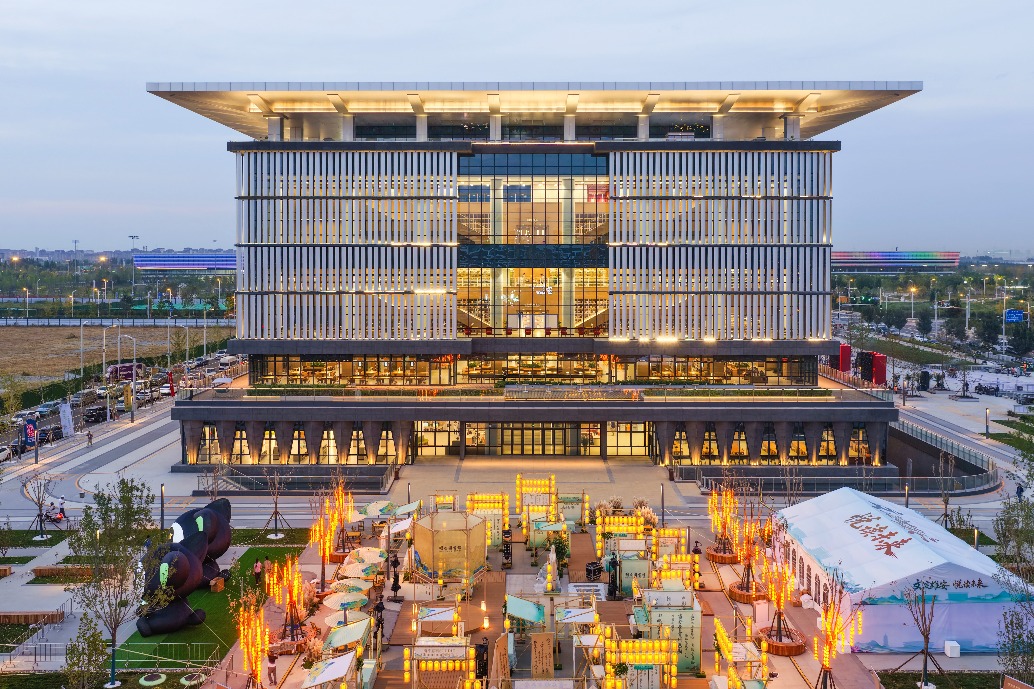Shanghai subsidizes maternity insurance
Local policy echoes broader push to reduce childbirth costs for companies

The Shanghai government has pledged to cover half the social insurance fees an employer in the city pays for a female employee who gives birth during her tenure.
Experts perceived this as the latest effort by the authority to support maternity and reduce costs for employers while advancing gender equality in the workplace.
The new regulation is among a series of pro-natal policies that have been rolled out recently.
In late July, the country introduced a nationwide child care subsidy program, which will offer families 3,600 yuan ($501) per year for each child under age 3. On Thursday, officials with the Ministry of Finance said all children in the final year of kindergarten will be exempted from care and education fees in the upcoming autumn semester, benefiting about 12 million children.
The new Shanghai regulation said the government will assume 50 percent of the employer's actual contributions to the female employee's basic pension, medical, unemployment and work injury insurance for six months starting from the month she gives birth. This policy applies to female employees who have given birth since Jan 1, regardless of whether it's their first, second or third child. The city currently allows women 158 days of maternity leave.
The government said the new policy is to establish a cost-sharing mechanism for maternity among the government, society and enterprises, further reinforcing the value of maternity friendliness and breaking down barriers to female employment.
According to the policy, employers are required to pay the social insurance fees for female employees who give birth as usual, and can apply for reimbursement within a one-year period after the employee returns from maternity leave.
In a pioneering move, Shanghai's neighboring Jiangsu province in early 2022 initiated a similar policy where employers are provided with subsidies on social insurance fees for female employees on maternity leave.
Employers get 50 percent and 80 percent of the fees subsidized, respectively, if the employees give birth to a second and a third child.
In January, the coverage was expanded to include subsidies for employers with workers who are first-time mothers.
Similarly, Zhejiang province has also been providing a 50 percent subsidy for a female employee's social insurance fees borne by the employer during her maternity leave for six months since June 2022.
Many women, both mothers and those yet to have children, praised such policies as a significant step towards building a more maternity-friendly society.
"Those policies of prolonging maternity leaves may end up making women more unpopular in the job market, even if we know it all starts with goodwill. In comparison, such initiatives really reduce the burden on enterprises. A maternity-friendly society requires efforts from various sides, and we cannot ignore the conflicts between companies and female jobseekers," said Lin Xiaojie, 39, who works in the human resources department of an automotive enterprise in Suzhou, Jiangsu.
While cheering efforts by the government to introduce more policies that can boost confidence in childbearing, many working women called for legislation mandating paternity leave. Some even said the length of maternity leave and paternity leave should be equal.
Although there is a countrywide provision for paternity leave for new fathers, many women said that, in reality, their spouses continue to work, as some are unwilling to take time off or their employers do not approve it.
Wang Shuangchen, 37, is a mother of a 5-year-old boy and lives in Shanghai. She expressed concern about the stigma attached to female employees who need to take maternity leave.
"I believe one way to solve this deadlock between female employees and employers is to force male employees to take leave after becoming fathers, which can be as long as what a woman is subject to, so as to reduce discrimination against women in the workplace," said Wang, a book editor.
"Involving fathers in childcare as much as possible from the initial phase of a newborn's life also helps ensure better gender equality in childcare responsibilities and promote stronger parent-child relationships," she said, adding that a family dynamic where a child relies solely on the mother is outdated.
- China expected to handle 2.36 billion passenger trips during the upcoming holiday
- World's tallest bridge opens to traffic in Guizhou
- China forecasts average of 2m border crossings over upcoming holiday
- Xinjiang transforms deserts into renewable energy goldmine
- World's highest bridges in China become a magnet for extreme sports enthusiasts
- UNESCO Confucius Prize for Literacy honors innovative education projects




































